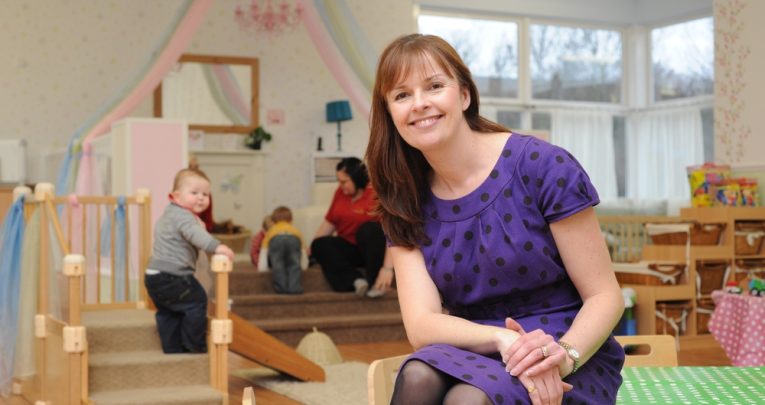Why Your Setting Needs Staff With Early Years Teacher Status

Nursery leader Sarah Steel explains how settings large and small can stand to gain from taking on staff with Early Years Teacher Status…

- by Sarah Steel

Nurseries are the foundation of a child’s education. It’s not just the place where they often first learn how to spell and count – the building blocks they need for primary school – but the environment in which they will start to develop their core skills, such as imagination, creativity and social interaction.
A child’s early years in education are some of the most crucial to their development – and the people responsible for their learning, their teachers, have the opportunity to make a huge, lasting impact.
Extended knowledge
As the Managing Director of The Old Station Nursery Group, I’m lucky enough to work with some fantastic teachers who each have a vast amount of experience in working with very young pre-school children. I’ve found it particularly valuable to have members of staff with early years teacher status (EYTS) – a nationally recognised status that helps to increase standards across the board – among my 90-strong workforce.
Individuals who have undertaken early years teacher training bring in outside knowledge and experience to our nurseries and have a really positive impact, both on the children and the other staff. In fact, having early years teachers as part of my team has really helped to provide everyone with a sound understanding of early years education – our current early years teacher with EYTS has brought extended knowledge and confidence to the role of nursery manager, for example.
The value of EYTS can come in the form of both theory and practice. It might be a member of staff implementing modern thinking and innovations to help children get to grips with numeracy through play, or someone using their leadership and management skills to introduce, say, an app for parents they can use to monitor their child’s progress and share feedback.
I’m looking forward to bringing the new methods and techniques I’m learning on the course into my workplace, as well as the international early years consultancy work I do in India, Dubai and China, and sharing this knowledge with colleagues there.
A sense of professionalism
There are four training routes that lead to EYTS, including a route for graduates and another for those already employed in an early years setting who wish to progress in their career. The course fees on the employment-based route will be paid for you, and in addition, for each trainee there is an extra £7,000 available to their employer.
This extra funding can help employers with various costs, such as paying for supply cover whilst their employee attends training days or completes placements in other early years settings. Employees with EYTS status have been shown to make a lasting, positive impact on young children’s wellbeing and progress, at the most crucial stage of their development
From my own experience, those in my workforce achieving EYTS have been given a real sense of professionalism that’s increased their confidence and honed their ability to promote excellent practice in the future. They know that they are doing things ‘the right way’ and have the authority to share this knowledge with colleagues, meaning everyone in the setting will be able to benefit from having EYTS staff on the team.
We ourselves are open to have many more staff continue in this direction, so that we can further improve outcomes for the children.
As an employer that has seen first-hand the value that early years teachers can bring to the dynamic demands of a nursery, I fully support the National College for Teaching and Leadership’s efforts at encouraging more early years teacher applicants, and persuading nurseries to look at increasing their proportions of EYTS staff. Nursery staff interested in applying for EYTS training can find more details here; further information for nursery and early years employers is available here
Sarah Steel is the managing director of The Old Station Nursery Group, which operates across Oxfordshire and Gloucestershire; for more information, visit theoldstationnursery.co.uk or follow @nurserysarah
It’s for these reasons that I regularly take on employees with EYTS as part of my team, who look after 350 children across our nurseries.
Rooted in theory
One of my teachers – a mum of five – recently gained EYTS following the completion of her Early Childhood Studies degree and early years teacher training, whilst also working full time. She has become a great role model and source of information for the rest of the team, and is currently implementing a form of peer observation that’s helping to develop a culture of continuous improvement across the group.
A real benefit of EYTS is that as well backing up what teachers have learnt on the ground day-to-day, it’s rooted in background theory too. For example, an understanding of the ‘oneness of one’ and how children learn the concept of cardinality has really helped to inform how we plan and deliver our maths activities.
Similarly, a thorough understanding of how children develop phonological awareness and eventually learn to read is taught as part of early years courses, which has given me and others sufficient depth of knowledge to introduce and support a phonics programme within my nursery group.
Having seen the benefits that early years teachers can bring to a nursery, I’ve since decided to become qualified myself and am currently undertaking my early years teacher training at Gloucester University – for which my course fees of £7,000 are covered by government funding.
I’m looking forward to bringing the new methods and techniques I’m learning on the course into my workplace, as well as the international early years consultancy work I do in India, Dubai and China, and sharing this knowledge with colleagues there.
A sense of professionalism
There are four training routes that lead to EYTS, including a route for graduates and another for those already employed in an early years setting who wish to progress in their career. The course fees on the employment-based route will be paid for you, and in addition, for each trainee there is an extra £7,000 available to their employer.
This extra funding can help employers with various costs, such as paying for supply cover whilst their employee attends training days or completes placements in other early years settings. Employees with EYTS status have been shown to make a lasting, positive impact on young children’s wellbeing and progress, at the most crucial stage of their development
From my own experience, those in my workforce achieving EYTS have been given a real sense of professionalism that’s increased their confidence and honed their ability to promote excellent practice in the future. They know that they are doing things ‘the right way’ and have the authority to share this knowledge with colleagues, meaning everyone in the setting will be able to benefit from having EYTS staff on the team.
We ourselves are open to have many more staff continue in this direction, so that we can further improve outcomes for the children.
As an employer that has seen first-hand the value that early years teachers can bring to the dynamic demands of a nursery, I fully support the National College for Teaching and Leadership’s efforts at encouraging more early years teacher applicants, and persuading nurseries to look at increasing their proportions of EYTS staff. Nursery staff interested in applying for EYTS training can find more details here; further information for nursery and early years employers is available here
Sarah Steel is the managing director of The Old Station Nursery Group, which operates across Oxfordshire and Gloucestershire; for more information, visit theoldstationnursery.co.uk or follow @nurserysarah










